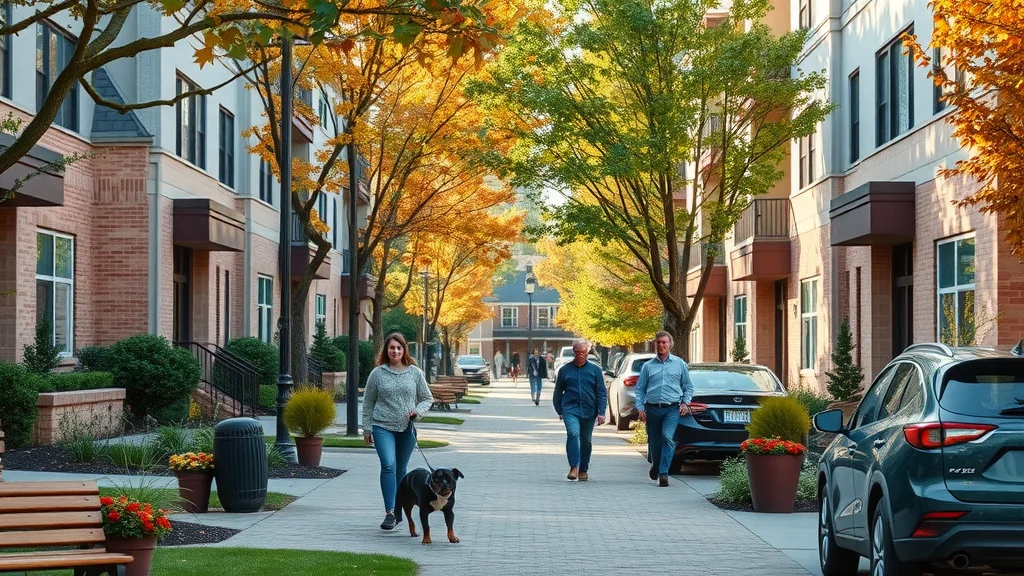Searching for your dream home in Charlotte, NC, can feel overwhelming, especially with so many options and factors to consider. That’s where our “Unlock Your Perfect Home: Essential Renter’s Guide for Charlotte, NC!” comes into play. This comprehensive guide is designed to simplify your journey, offering practical tips and insider knowledge to help you navigate the local rental market. Whether you’re a first-time renter or a seasoned pro, mastering this renter guide will empower you to make informed decisions, ensuring you find a place that truly feels like home.
Understanding the Charlotte Rental Market
Charlotte, known as the Queen City, is one of the fastest-growing cities in the South, attracting renters from all walks of life. Understanding the rental market here is crucial for finding the right home while ensuring that you are aware of the current trends and pricing.
Overview of Rental Prices in Charlotte
In Charlotte, rental prices can vary widely based on factors such as location, size, and amenities. Here’s a snapshot of the average rent and trends:
Area |
Average Rent (1 Bedroom) |
Average Rent (2 Bedrooms) |
|---|---|---|
Uptown Charlotte |
$1,800 |
$2,500 |
South End |
$1,600 |
$2,200 |
Ballantyne |
$1,500 |
$2,000 |
University City |
$1,200 |
$1,800 |

Key Insights:
- Average rent in Charlotte is lower than the national average, making it an attractive option for renters.
- Rental prices can vary significantly between neighborhoods, with Uptown Charlotte being the most expensive area.
Key Factors Influencing Rent Prices
Several factors can influence rental prices in Charlotte:
- Location: Proximity to downtown, public transportation, and amenities.
- Property Type: Apartments, single-family homes, or townhouses.
- Market Demand: Popular neighborhoods may see higher rent due to demand.
- Amenities: Pools, gyms, and community services can elevate rental costs.
Legal Considerations for Renters in Charlotte
When renting in Charlotte, understanding your rights and responsibilities is crucial. This section covers essential legal aspects to ensure a smooth renting experience.
Understanding Lease Terms and Agreements
A lease agreement is a legally binding document that outlines the terms of your rental. Familiarizing yourself with common lease terms is essential:
Lease Term |
Description |
|---|---|
Security Deposit |
Amount paid to cover potential damages. |
Lease Duration |
Length of the rental agreement (e.g., 12 months). |
Rent Due Date |
The date by which rent must be paid. |

Common Lease Terms Explained
Security Deposit: Generally equal to one month’s rent, this deposit is refundable unless damages occur.
Grace Period: A specified time after the due date in which you can pay rent without incurring a late fee.
Automatic Renewal: Some leases may automatically renew unless you provide notice otherwise.
“Understanding your lease terms can save you from potential disputes with your landlord.”
Tenant Rights and Responsibilities
As a tenant in Charlotte, you have rights protected by North Carolina law. These include:
- The right to a habitable living environment.
- Protection against discrimination under the Fair Housing Act.
- The right to privacy and proper notice before entry by the landlord.
Finding the Right Rental Home in Charlotte
With so many options available, finding the right rental home in Charlotte requires effective strategies. This section provides tips to streamline your search.
Utilizing Online Platforms to Find Apartments
Online platforms have revolutionized the way renters find apartments. Here are some top websites:

Working with Real Estate Agents
While you can search for rentals independently, working with a real estate agent can simplify the process. Here’s why:
Benefits of Hiring a Real Estate Agent
Expertise: They understand the local market and can provide valuable insights.
Access: Agents have access to listings that may not be available online.
Negotiation: They can negotiate lease terms on your behalf.
How to Choose the Right Agent
Look for agents specializing in rentals in Charlotte.
Check reviews and testimonials from previous clients.

Understanding Tenant Rights and Fair Housing
Being informed about tenant rights and fair housing laws is essential for a successful rental experience in Charlotte.
Fair Housing Laws in North Carolina
North Carolina’s Fair Housing Act prohibits discrimination based on race, color, national origin, religion, sex, familial status, or disability. It’s crucial for renters to know their rights:
Your Rights as a Tenant |
Description |
|---|---|
Right to Fair Treatment |
Protection against discrimination. |
Right to Safe Housing |
Landlords must maintain habitable premises. |
Right to Privacy |
Landlords must give reasonable notice before entering your apartment. |

What to Do if Your Rights Are Violated
If you believe your rights have been violated:
1. Document the incident.
2. Contact the North Carolina Human Relations Commission.
3. Seek legal counsel if necessary.
Moving to Charlotte: What to Expect
Moving to a new city involves many considerations, especially in a vibrant place like Charlotte, NC.
Neighborhoods to Consider
Charlotte is home to diverse neighborhoods, each with its unique charm. Here’s a brief overview:
Neighborhood |
Highlights |
|---|---|
Uptown |
City center, nightlife, and entertainment. |
South End |
Trendy shops, breweries, and art galleries. |
Ballantyne |
Suburban feel with parks and schools. |
NoDa |
Artsy vibe with music and cultural festivals. |

Public Transportation and Accessibility
Charlotte has a robust public transportation system, including the light rail and bus services, making it easier to navigate the city.
Navigating the Light Rail System
The light rail connects key areas, including Uptown and South End.
Consider purchasing a monthly pass for unlimited travel.
Alternative Transit Options
Biking is popular in many neighborhoods.
Rideshare services like Uber and Lyft are widely available.

Preparing for the Rental Application Process
Once you’ve found a rental home, you’ll need to prepare for the application process. Here’s what you need to know:
Essential Documents Needed
Before applying, gather the following documents:
- Proof of Income: Pay stubs or tax returns.
- Credit Report: A good credit score can enhance your application.
- Rental History: Documentation of previous rentals.

Understanding Security Deposits and Fees
Security Deposit: Typically one month’s rent, refundable if the property is returned in good condition.
Application Fees: Some landlords may charge a fee to process your application.
Calculating Your Budget for Renting
When budgeting for renting, consider the following:
1. Monthly Rent: Keep within 30% of your monthly income.
2. Utilities: Account for electricity, water, and internet.
3. Transportation Costs: Factor in public transit or commuting expenses.
Successfully Renting in Charlotte, NC
Renting in Charlotte can be a smooth experience if you are well-prepared. Here are some tips to ensure success.
Tips for a Smooth Renting Experience
Read the Lease Carefully: Understand all terms before signing.
Document the Condition of the Property: Take photos upon moving in.
Communicate with Your Landlord: Address any issues promptly.
Avoiding Common Pitfalls
Ignoring Lease Terms: Make sure you understand all agreements.
Neglecting Tenant Rights: Know your rights to avoid disputes.
Rushing the Application Process: Take your time to find the right place.

The Importance of Renters Insurance
Renters insurance provides essential coverage for your belongings. Here’s why it’s important:
What Renters Insurance Covers
Personal property damage.
Liability coverage in case of accidents.
Additional living expenses if you cannot stay in your rental.
How to Choose the Right Policy
Compare quotes from multiple providers.
Check what coverage is included.
Consider additional coverage for high-value items.

Moving Checklist for New Renters
As you prepare to move, use this checklist:
- Notify your landlord in advance.
- Set up utilities (e.g., Duke Energy).
- Plan your moving day logistics.

Conclusion: Your Next Steps as a Renter in Charlotte, NC
Finding a rental home in Charlotte can be both exciting and daunting. By utilizing this renter guide for Charlotte NC, you can navigate the local rental market with confidence.
Key Takeaways
Understand the Charlotte rental market and price trends.
Familiarize yourself with legal considerations and tenant rights.
Use online platforms and consider working with real estate agents.
Prepare for the rental application process with essential documents.
Protect yourself with renters insurance and know your budget.
With the right knowledge and preparation, your journey to finding the perfect home in Charlotte will be a rewarding experience!
Frequently Asked Questions (FAQs)
1. What is the average rent in Charlotte?
The average rent for a 1-bedroom apartment in Charlotte is around $1,500, varying by neighborhood.
2. How do I find apartments in Charlotte?
You can find apartments through various online platforms such as Zillow and Apartments.com or work with a real estate agent.
3. What are my rights as a tenant in Charlotte?
As a tenant, you have rights to a habitable living space, protection against discrimination, and privacy.
4. Do I need renters insurance in Charlotte?
While not legally required, renters insurance is highly recommended to protect your belongings and provide liability coverage.
5. What should I include in my rental budget?
In addition to rent, consider utilities, transportation, and renters insurance in your budget calculations.
 Add Row
Add Row  Add
Add 




Write A Comment